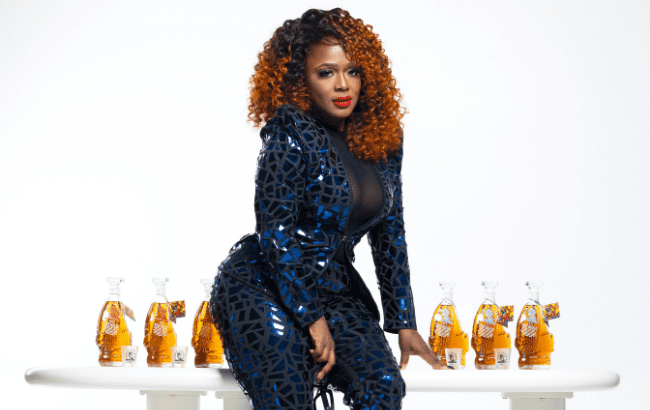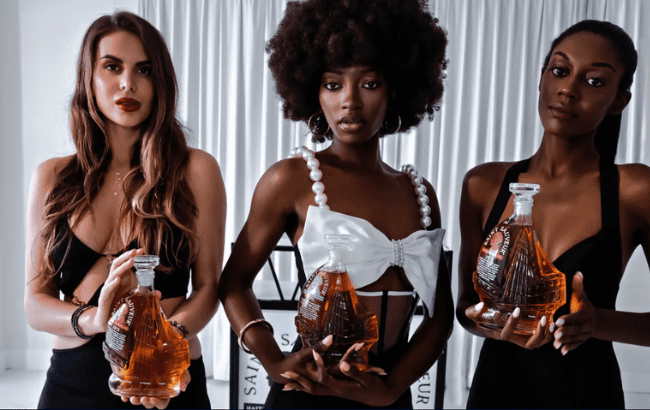Melky Jean talks rum, Haiti and Saint Sauveur 1972
By Rupert HohwielerFrom her grandma’s ‘moonshine’ to a refugee ship, Melky Jean spoke to us about how her Haitian-American roots have shaped her rum brand.

Saint Sauveur 1972 is a rum brand founded in May by Melky Jean, a Haitian-American singer-songwriter who is the younger sister of Wyclef Jean. Naturally being Haitian-American, Jean’s rum upbringing started early.
“You’re having rum with your tea,” Jean tells The Spirits Business of her introduction to the spirit. “That’s the first experience, you’re sick, and mommy put a little rum in your tea.”
With rum then being ingrained as the natural choice of spirit, Jean first had the idea of moving into the category around 10 years ago. “When I wasn’t on the road, I used to host events. I hosted parties for the Grammys, MTV, VH1, and when I was hosting these parties, that’s when spirits brands first started to come to me to promote – I was doing that for about 20 years.
“In doing that, and understanding the business, understanding the consumer, I like to say ‘It was like being one of the first influencers’, you’re realising that you’re making a ton of money for everybody else, and you’re literally the one doing all the work.”
Bringing affordable luxury to rum
Jean produces Saint Sauveur in Florida, at a distillery less than 100 miles from where the Saint Sauveur ship the brand is named after it first landed in the US. She doesn’t produce in Haiti due to the political instability.
“I’m trying to grow a brand,” she says. “My end goal is to wind up back home in Haiti, but Florida is as Caribbean as you’re going to get. We’re like cousins, and I’m able to get the flavour profile that I was looking for because it’s mimicked after a drink that my mother and my grandmother made.
Jean’s grandmother was the first influence on how she wanted her rum to be, followed by her mother. Both made their own homemade spirits. It runs through the family, she explains: “My grandmother used to make something called kléren in the 1930s and 1940s, and, depending on who you speak to, they’ll say it’s either overproof rum or moonshine – basically because moonshine literally just means something that’s made under the moon.
“Now regarding my mother, who is 82 years old to this day, if you go to the Jean household, you’re not leaving without purchasing a bottle of her rum. She makes this drink called Kremas, which is a staple, by hand with coconut. A lot of Haitian women grew up making this drink.

“My mom learned how to make it as a little girl, and my dad used to not allow my mother to work. He was very old school, and so my mother would make Kremas, which is the equivalent to, like a Coquito, or eggnog. It’s very similar in texture. My rum mimics it without it being too creamy or heavy, more so the smooth notes.
Jean has two rums in the range: a two-year-old aged rum and a four-year-old reserve rum.
The flagship is the two-year. Jean says they’ve been doing tastings with thousands of people who enjoy it as a sipping rum, but also for making cocktails “because it’s so versatile”. She adds that people also chill it and do it as a shot.
She then calls the four-year-old rum the “Rolls Royce” because it’s a bit more expensive (priced at US$49.99 compared to US$38.99 for the two-year).
“You don’t mix that one at all,” she says. “That’s the one you just put a big cube in and you enjoy as you would a Cognac or whisky.”
“This isn’t a white label situation,” she continues. “And I’m all good with white label situation, but that’s just not what this is. The least amount of money people thought we were going to be selling our two-year for was US$85. When we came into the market at US$38.99 retail, people were like ‘what?’, you know, because I do believe that luxury should be affordable. I think that we all deserve luxury in our lives.”
Tribute to Haitian history
As for the name Saint Sauveur, it carries a lot of significance for Jean and her background. “My dad always said a name is very important and he always made sure to give his children these amazing names. And so when I was doing my research, and growing up in the United States, I had always heard of the Mayflower, and it got me thinking about my Haitian-American roots,” she recalls.
Jean found that the first documented Haitian refugee ship was called the Saint Sauveur, which arrived in South Florida, on 12 December 1972. That year was also the year her mother arrived in the US. “Haiti had been free since 1804, so the question is, well, why were there so many refugees coming to the United States in that time? Including my mother.
“She wasn’t on the ship, but you had a dictator [François Duvalier] who had said that he was going to be president for life – and his dad was president for life, and now the son was going to be president for life. And a lot of the Haitian people were like ‘okay, it’s time for us to seek economic and political freedom’.”
Jean founded a non-profit organisation called Carma 17 years ago, which intends to help poor and vulnerable women and children in Haiti. On how Saint Sauveur will be linked, she says: “There is nothing that I’m a part of that will not directly affect the work that we’re doing at Carma Foundation. We’ve done things from scholarship programmes to financial literacy programmes. We’ve given over a quarter million shoes to people in need.”
Although she grew up with the spirit, Jean doesn’t consider herself a rum snob. She says: “Being Haitian-American, growing up with uncles who drank rum, hearing the dominoes smack on the table while my uncles were drinking rum, it’s just very much part of my culture. But what I find with rum, even with the tastings that I do, is that you’ll have people who know everything about rum. They’ll be able to tell you this, that and this, but when the consumer tastes it, it’s really about getting the juice on their lips.
“Everyone has their own personal experience with rum,” she adds, “and that’s what I love about it. It’s like the Caribbean. If you go to Antigua, you’re going to have an experience. If you go to Barbados, you’re going to have an experience. If you go to Guyana, you’re going to have an experience. And if you go to Haiti, you’re going to have an experience – same thing with rum.”
Jean feels the rum category is in a rebranding period as more people discover it outside of its stereotyped occasions.
“When people used to think of rum, they weren’t thinking about it in a sexy way,” she says, “like when people talk about vodka or Tequila – rum is just this laidback drink.
“We’re part of rebranding what rum looks like. So when people come to our experiences, which is what I call our events, they’re experiencing rum in a different way. We’re highlighting rum where it’s not just this really sweet drink – no, rum has notes, rum is complex, rum has layers to it. So people can understand that rum is here, and we can absolutely compete with the Tequilas, the vodkas and Cognacs.”

Roadmap and strategy
Jean is currently hosting her experiences around the Florida area to grow awareness for the brand. “I call them the Saint Sauveur 1972 experiences,” she says. “We did our launch in our home. Guests saw pictures of my mother, my grandmother, they saw pictures of the brand. They were able to experience it in a very authentic way. There’s always music, and being in the entertainment world, guests were greeted by a band. Baby Cham performed and DJ Stakz was there – a famous, international Haitian DJ.”
Jean emphasises that her tastings won’t just be ‘regular tastings’. “They’re going to be an experience because rum is not just about the juice, or the beautiful bottle. It’s also about the culture, which brings us together, to tell stories, and to play dominoes.”
Besides its retail presence and availability online (Saint Sauveur is available online in all 50 US states), Jean is targeting local bars, cigar bars and mom and pop restaurants. “We’re part of the culture of Florida, and wherever there’s food and drink, that’s where we are, that’s where you will find us.”
Being based Florida, the leading state for rum sales in the US, also has its obvious advantages, which Jean explains: “Whether you can start all the way down in Key West and make your way all the way up, in terms of how we use the fruits and the juices that we naturally produce, Florida just a great place for cocktails that work with rum. It essentially mimics the Caribbean in so many ways.
“Rum cocktails are like no other. I love to refer to rum cocktails as instant vacations. You do have the Mojitos, the Daiquiris, but we’ve also been making Mules.”
She says her background as an artist has put her in good stead for pushing the brand where it needs to be. “Being a promoter and being a consumer on a high level has made me proficient in understanding what we need to do with our brand.”
Outside of the US, Jean already has an eye on international markets, such as the UK. “I definitely see the UK as one of our next markets,” she says. “Absolutely because the UK is a big, strong rum market and naturally, because of the connection with such a huge Caribbean diaspora over there.
Down the line, she confirms she’s already working on releasing a few more premium rums, but the focus is on the current lineup.
“I see us launching a new product in about another year or two, but right now, we just want to get people familiar with our flagship and our four years. As the brand grows, we definitely want to introduce new SKUs, and become more of a household name.
“We’re still brand new, but we’re making a lot of noise. There’s not too many places in Florida now where you’re gonna go and you’re not going to see our name and our branding. We’re making a great name for ourselves.”
Related news
Goslings Rum appoints new UK distributor
